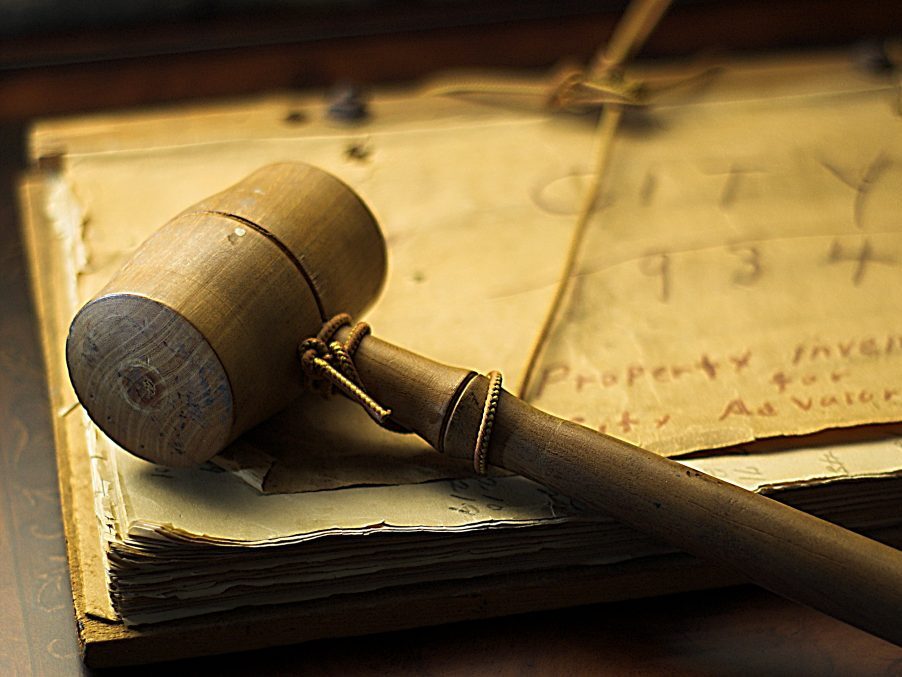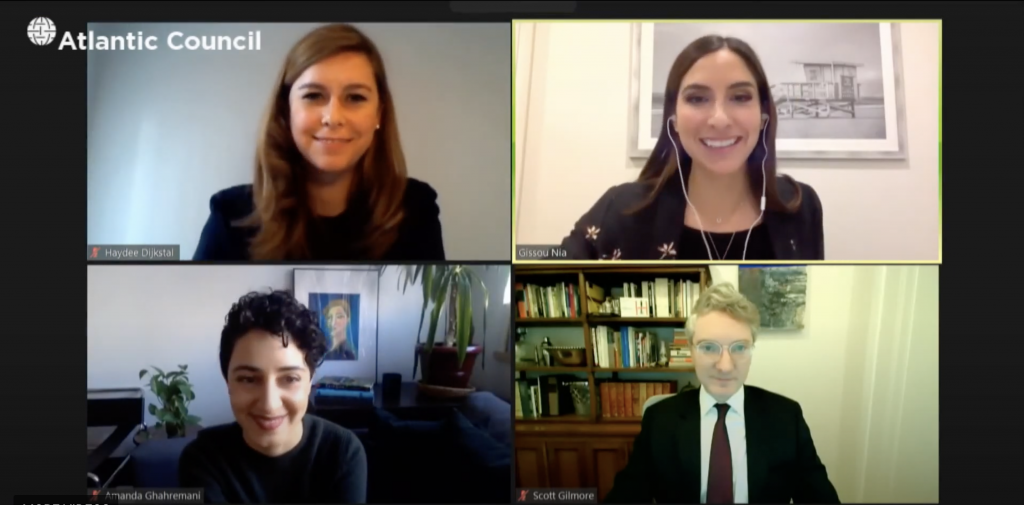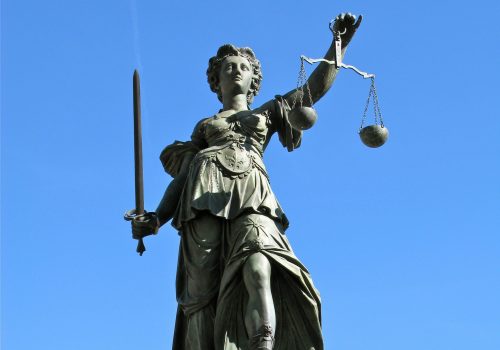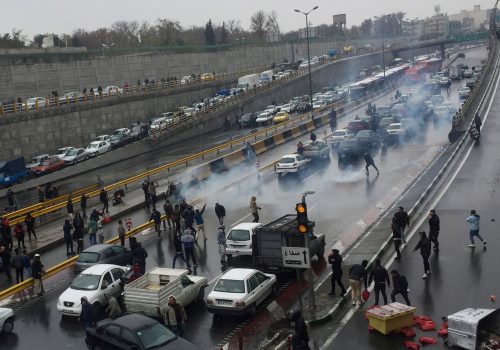On December 15, 2020, the Atlantic Council launched its Strategic Litigation Project. Atlantic Council nonresident senior fellow Gissou Nia and a panel of litigators—Haydee Dijkstal, Amanda Ghahremani, Scott Gilmore—discussed the tools through which the perpetrators of gross human rights violations in the Islamic Republic of Iran (IRI) can be held accountable in the United States, Europe, and Canada. The panel follows the release of the Strategic Litigation Project’s debut report, “Closing the Accountability Gap on Human Rights Violators in the Islamic Republic of Iran through Global Litigation Strategies,” which focuses on current strategic litigation tools and possible new legal mechanisms to hold IRI officials accountable for human rights violations and atrocity crimes.
The Strategic Litigation Project begins by focusing on Iran, where widespread and systematic human rights violations and a lack of justice and redress for victims and survivors have been overshadowed by concerns over its nuclear program and other regional and global issues. The international community needs targeted options that penalize bad actors without using collective punishment, kinetic warfare, or other policies that harm civilians. While we normally consider international courts to be the primary venue for legal accountability for human rights violations, the front line is often in national courts. This is where civil litigation tools can be used to seek accountability for international crimes.
Existing litigation against states
- The US Foreign Sovereign Immunities Act (FSIA): The FSIA is a law that grants immunity to foreign states from being sued in US courts, with a few exceptions, including states designated as State Sponsors of Terrorism. This exception waives the immunity for states like Iran and Syria with respect to torture, extrajudicial killings, and hostage-taking against US citizens and their immediate relatives. This is exemplified in the case of Marie Colvin, who was killed in an artillery barrage while reporting on the Syrian Civil War for the Sunday Times of London in 2012. As she was a US national, there was a jurisdictional basis to sue the Syrian government, which was found liable for damages under the FSIA. A similar case would be able to be presented for human rights violations committed by the Iranian government.
- Canadian State Immunity Act: This act grants immunity to foreign states, the head of their governments, public officials, etc. from being sued through civil actions in Canada, even if the victim is a Canadian citizen. The act includes exceptions for commercial activity, injury, and property damage that occur in Canada.. However, unlike the US FSIA, the State Immunity Act does not include exceptions for gross human rights violations such as torture. This was challenged in the Supreme Court of Canada in 2014 in the case of Kazemi Estate v. Islamic Replublic of Iran. The case sought to sue the IRI for damages related to the death of Canadian photojournalist, Zahra Kazemi, who was tortured, sexually assaulted, and killed. The Supreme Court dismissed this case, placing the responsibility on amending the State Immunity Act for an exception for acts of torture.
- United Kingdom (UK) judicial review proceedings: In the UK, judicial review proceedings can be brought to challenge the exercise of power or administrative decision by review from a domestic court, which can be used to prevent future human rights violations. The justification of these reviews usually surrounds the legality of the decision, an error of law, irrationality, or procedural error. In 2019, a judicial review proceeding challenged the UK’s government decision to export arms to Saudi Arabia, which were then used in instances of human rights violations in Yemen. In light of the transgressions, the review found the government’s decision to be irrational and therefore unlawful. The court ordered the government to review outstanding licenses and halt any new export licenses.
Existing litigation against corporate actors and individuals
- Civil law in the UK: Civil law allows the ability to seek accountability for human rights violations after they occur, as well as prevent and deter violations, particularly by addressing corporate responsibility. In 2019, the UK Supreme Court found that rural communities in Zambia could bring suits against a UK company for human rights violations. The Rural communities in Zambia had been exposed to toxic discharge from a copper mine owned by the UK company’s subsidiary. Based on the United Nations’ principles on business and human rights, the court decided that the case had UK jurisdiction and that the UK company owed a duty of care. A similar case involving Syrian refugees filing for damages against Qatar’s Doha bank for support of terrorist organizations is also pending in the UK courts.
- Potential US jurisdiction against Iranian entities: To establish jurisdiction in the United States, there needs to be a nexus between the perpetrator or accomplice to the United States. A good example of this is the US financial system, as any international monetary transaction in US dollars is cleared through a bank in the United States. This means that if an Iranian entity, such as the IRGC, wires payments through a shell company to a western financial institution, they have reached into US territory and are subject to jurisdiction in US courts.
- Law of corporate accountability in Canada: In 2020, the Supreme Court of Canada ruled in favor of Eritrean plaintiffs who alleged that they were subjected to forced labor at a gold mine in Eritrea owned by a Canadian company.This ruling established that Canadian corporations can be held accountable for violations of international laws that protect human rights. Additionally, the ruling established that Canadian corporations are not protected by the Act of State doctrine, meaning that corporations cannot be shielded in violations of international human rights law even if the conduct is permitted or sanctioned by a state. This also means that corporations can be held responsible for complicity in human rights violations. However, it should be noted that the standard set is for Canadian corporations. Thus, for this to apply to Iran, there would have to be Canadian corporations in Iran that are directly involved or complicit in human rights violations.
- Global Magnitsky legislation: In 2020, both the European Union and UK adopted a form of the United States’ Global Magnitsky Act, which allows governments to sanction individuals involved in human rights violations and acts as a deterrent mechanism against such violations. In the UK, the Secretary of State conducts the designation process and only needs to be assured that the standard is reasonable. As this is a very new law, it will be interesting to see how victims of human rights abuses will be able to deter further abuses by petitioning the state to sanction individuals who violated their rights.
Challenges ahead
- Lack of Admissible Evidence: There are many human rights groups, including those that focus on Iran, that focus on the violation rather than on the perpetrator and the linkage evidence needed to pass muster in suits. The establishment of a body of evidence is a precondition for the suit, but also proves to the inherently political nature of these cases to which there is a legitimate case to pursue and to designate scarce resources
Lucy Grathwohl is an intern with the Atlantic Council’s Middle East Programs.

The Atlantic Council’s Strategic Litigation Project injects fresh thinking into how governments and practitioners can apply legal tools to advance human rights and democracy around the world.



